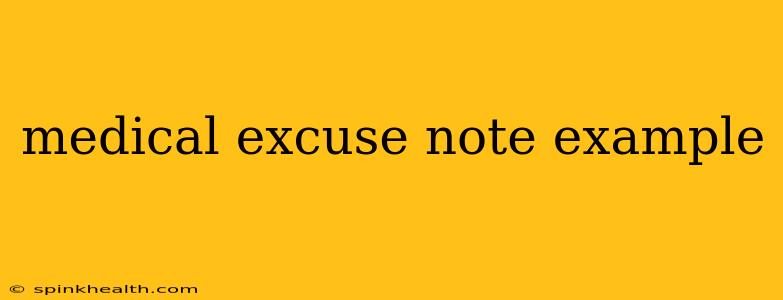Crafting the Perfect Medical Excuse Note: A Guide Through the Labyrinth
Let's face it, needing a medical excuse note can feel like navigating a maze. Whether it's for work, school, or another important commitment, getting the right documentation can be stressful. This guide will help you understand what makes a strong medical excuse, addressing common questions and offering examples. We'll explore the crucial elements needed for a convincing and legally sound note.
Remember, this guide offers examples and explanations. It's not a substitute for actual medical advice or a legally binding document. Always consult with your healthcare provider for proper medical care and documentation.
What information should a medical excuse note include?
A comprehensive medical excuse note needs several key pieces of information to be effective. It's not just about stating you were ill; it's about providing verifiable evidence of your condition and its impact on your ability to fulfill your obligations. A strong note will include:
- Patient Information: Your full name, date of birth, and contact information.
- Date of Visit: The date you saw the doctor or other healthcare professional.
- Diagnosis: A clear and concise description of your illness or injury. Avoid vague terms like "not feeling well."
- Dates of Illness/Incapacity: Specify the exact dates you were unable to perform your duties due to your medical condition. Be precise!
- Restrictions: If you have any limitations resulting from your illness (e.g., limited lifting, need for frequent rest), these should be clearly stated.
- Provider Information: The doctor's or healthcare professional's name, license number, practice address, phone number, and signature. This adds credibility to the note.
- Statement of Inability: A clear statement that confirms your inability to attend work, school, or the relevant commitment due to your medical condition. This directly addresses the reason for the note's existence.
What does a typical medical excuse note look like?
Here's an example of a well-structured medical excuse note:
[Doctor's Letterhead]
Date: October 26, 2023
To Whom It May Concern:
This letter confirms that [Patient Name], Date of Birth: [DOB], was seen in my office on October 24, 2023. Diagnosis: Acute Bronchitis. Due to the severity of their illness, [Patient Name] was unable to attend work/school from October 24, 2023 to October 27, 2023. They are expected to make a full recovery.
Sincerely,
[Doctor's Name] [Medical License Number] [Practice Address] [Phone Number]
Can I write my own medical excuse note?
No. It's illegal and unethical to forge a medical excuse note. Only a licensed medical professional can issue a legitimate medical excuse. Attempting to create your own could have serious consequences, including disciplinary action from your employer or school and even legal repercussions.
What if my doctor refuses to give me a note?
If your doctor refuses to provide a medical excuse note, there might be reasons for this. It's best to have an open and honest conversation with them to understand their concerns. They might need additional information or believe the documentation isn't necessary in your specific circumstance.
How long is a medical excuse note valid for?
The validity of a medical excuse note depends on the specific circumstances and the nature of your illness. Some notes may cover only a few days, while others might cover a longer period, particularly for more serious conditions. Always follow your doctor's recommendations regarding the duration of your absence.
Are there different types of medical excuse notes?
While the fundamental information remains consistent, the context and specifics might vary depending on your needs. For instance, a note for school might focus on attendance, while a note for work might emphasize limitations on specific tasks. Always clarify your specific needs with your doctor to ensure the note adequately addresses your situation.
Remember, honesty and transparency are crucial when dealing with medical excuses. Always consult with your healthcare provider for appropriate medical care and accurate documentation. This ensures you receive the necessary support and avoid potential legal or ethical complications.

